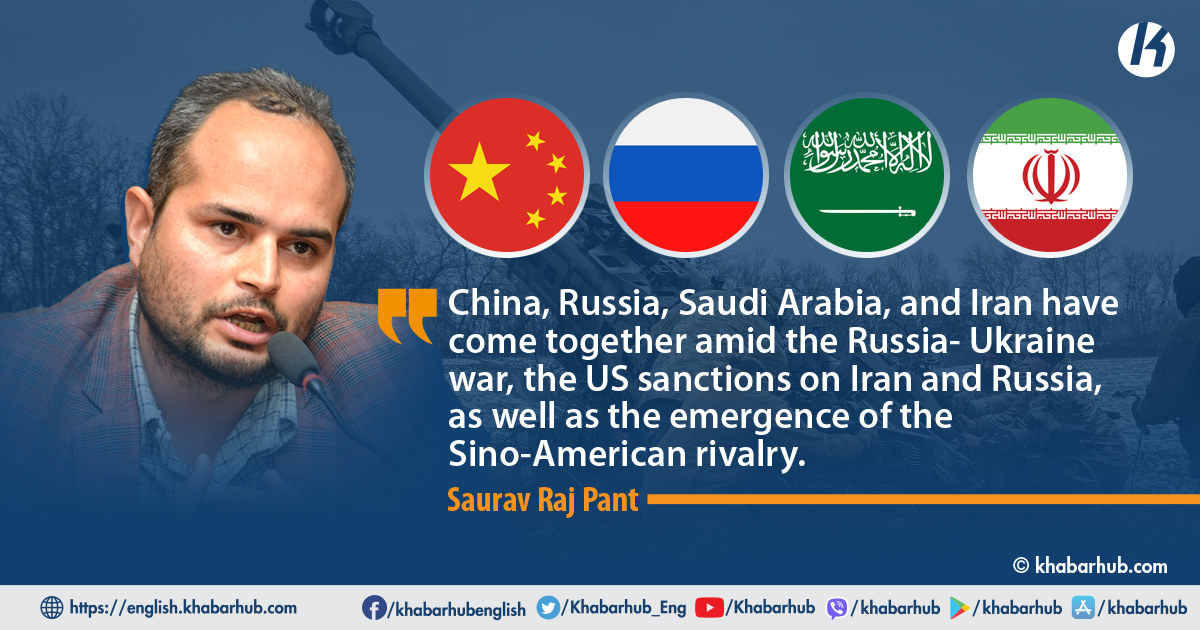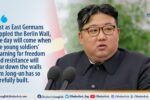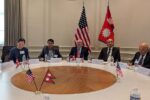On March 10, 2023, Iran and the Kingdom of Saudi Arabia (KSA) inked a trilateral agreement that was mediated by China to re-establish diplomatic connections between the two countries.
Many pundits decorating it as China’s first major diplomatic ice-breaking mediation project after Chinese President Xi’s in his third term of office.
As usual, the courtesy language of international diplomacy is very cheerful, and mild, and therefore rejects any sort of hidden vested interest.
In line with this, remarks of the Chinese Foreign Ministry Spokesperson stressed China’s no self-interest in the Middle East and therefore does not seek to fill the so-called vacuum or develop exclusive blocs.
While observing Chinese diplomacy in the past couple of years, China like other powerful nations claims to be the protector of vulnerable nations and provides a space for their self-autonomy. But in reality, there is always reading between the lines components.
This tri-lateral agreement shows China’s expanding influence in the Middle East by putting an end to their (Saudi-Iran) 7-years-long hostilities, which broke down in 2016, Iran and Saudi Arabia, both archrivals, decided to rebuild bilateral ties—the pertinent question of religious fundamentals blended by politics and economy although remains ambiguous.
The present trilateral pact, which China is currently facilitating, is also consistent with the Global Security Initiative, which is the Chinese equivalent of NATO and the idea of global security.
According to the trilateral agreement made in Beijing, Iran and the KSA will open their embassies in their respective nations within two months while respecting each other’s sovereignty and refraining from meddling in the affairs of the other.
The Secretary of the Iranian Supreme National Security Council, Saudi National Security Advisor and Chinese Foreign Minister Wang Yi participated in this trilateral agreement meeting.
Unexpectedly, the US has supported China’s efforts to promote de-escalating tension in the region even though China undertook this mediation without the US’s involvement.
The US continues by saying that even though the US and China frequently disagree on international and regional issues, this initiative is appreciated in light of the current world crisis.
Path ahead
Two perspectives are needed to comprehend China’s efforts to mediate peace in the Middle. First of all, the Chinese side wants to ensure its oil imports without disturbance( i.e easily through Strait Hormuz), which are plenty in Saudi Arabia and Iran.
According to Reuters, Saudi Arabia transported 1.75 million bpd, or 87.49 million tonnes, of oil to China in 2022, matching its output from the previous year.
Despite the weak domestic demand, China’s state-backed oil refiners generally completed their term contracts with Saudi in 2022.
The COVID-19 restrictions in China are easing making a way for an increment in Saudi/Iranian oil to China. Second, China is looking to join forces with those countries in the Middle East whose relations with the US in recent times degraded as well as those facing US sanctions. With this regard, KSA and Iran are the perfect choices for the Chinese.
Biden’s visit to the KSA and Israel in July 2022 wasn’t very much productive because, after a few months of his visit, OPEC+ countries decided to reduce oil output by 2 million barrels per day.
Next to it, Saudi Prince Mohammad Bin Salman (MBS) was displeased that the issue of human rights; which had been brought up by the US president during his visit to KSA.
As Saudi Arabia is one of the biggest consumers of American weapons and ammunition, policymakers in the US put pressure on the Biden administration to impose sanctions on MBS after the OPEC+ decision to curb oil production by the start of November 2022—targeting US Midterm elections.
Although not much significant impact was made on the result of the Midterm elections for Democrats. As per SIPRI, the principal suppliers to Saudi Arabia and their proportion of total imports are the US (78%), France (6%) and Spain (4.9 %). Saudi Arabia became enraged by the US’s wrath towards it and responded by warning the US about potential repercussions if any anti-Saudi remarks were made inside the US.
Meanwhile, President XI’s December 2022 state visit to Saudi Arabia to strengthen bilateral cooperation in the areas of business, weaponry, and energy served as a reminder of this turbulence in which the Chinese side played well by ditching the Americans.
During this heightened period of crisis, China, Russia, Saudi Arabia, and Iran have joined together due to the Russia- Ukraine war, the US sanctions on Iran and Russia, as well as the emergence of Sino-American rivalry. At last, war always brings permutation and combinations of a country’s alliance.
Following President Xi’s trip to Kingdom, Iranian President Raisi visited China in February 2023 to improve relations and to implement a 25-years deal on strategic cooperation between China-Iran that was inked in March 2021.
Underlining several public narratives, this partnership brought cheap Chinese items to Iran’s doorstep, and local products were threatened as a result of dumping.
In the background, separate bilateral talks between China, Iran, and the KSA set the way for the present trilateral deal.
The present trilateral pact, which China is currently facilitating, is also consistent with the Global Security Initiative, which is the Chinese equivalent of NATO and the idea of global security.
As per PRIF, “Chinese transparent discussion and communication as a means of resolving differences and explaining China’s position as a mediator in such negotiations carries a distinctively Chinese style of mediation that avoids blaming or applying direct political pressure on conflict parties, attempts to keep cordial relationships with all of them, and looks to capitalize on the ensuing key position for the advancement of Chinese interests”.
This deal as expected will make the UN-initiated Yemen truce solidify towards a peace process–which is being taking effect since April 2022 with an additional 2 months extension in October 2022.
As per Iran International, “The main issue is the crisis in Yemen, where the two nations(Iran & Saudi) have been at war inadvertently for eight years. Iran has supported Houthi rebels who drove the internationally recognized government from the capital and went on to take areas outside of their usual ethnic-religious realm. The Houthis launched a large number of strikes against sites within Saudi territory using Iranian missiles and drones while Saudi Arabia directly supported the anti-Houthi troops militarily”.
OPEC+ which was formed under the indirect initiation of Russia and thus wanted to expand the anti-American sphere of influence via ‘production control’ tactics of oil and ultimately counter the US interest.
In line with this, KSA thus has supported the OPEC+ political objectives since 2016 despite getting the US Security Umbrella. OPEC+ which comprises Russia, Iran, and Saudi (but not limited) has a high chance of getting Chinese support to expand its political objectives. If it happens, the weaponization of fossil fuels increases giving rise to non-fossil fuels energy exploration and production.
Normalizing relations between Saudi Arabia and Iran would also have a big influence on Israel. how Iran and Israel conduct themselves collectively because the current Prime Minister of Israel Benjamin Netanyahu had strongly criticized Israel for its nuclear programs.
As Yoel Guzansky, who is a researcher at the Center for National Security Studies says, the Saudi-Iran normalization effort gives a big setback to Israel as the country is trying to build an anti-Iran alliance in the area.
Although KSA also signaled full normalization of relations with Iran only after the full settlement of the Israel-Palestine conflict. Until now, only back-channel diplomacy between KSA and Israel is being carried out. This put, Netanyahu to initiate a different approach to adjust to this newly developed situation.
During this heightened period of crisis, China, Russia, Saudi Arabia, and Iran have joined together due to the Russia- Ukraine war, the US sanctions on Iran and Russia, as well as the emergence of Sino-American rivalry. At last, war always brings permutation and combinations of a country’s alliance.









Comment